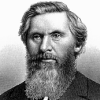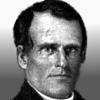
‘We may not innocently stand by and permit the infliction of injuries by others’ ‘by forces, both moral and legal, we prevent all others from the worse than murderous traffic in liquors that can intoxicate’
—Adam Crooks, 1870, Wesleyan Methodist Church.
If Orange Scott can be called the founder of the Wesleyan Methodist Connection, Adam Crooks would have to be named its perpetrator.
Lee M. Haines & Paul W. Thomas, 1990, An Outline History of the Wesleyan Church, Wesley Press, Indianapolis, p. 74.
“Now that the Heaven-insulting and Manvictimizing crime of chattel slavery has been abolished in this Country, the patriot, philanthropist and Christian can bestow more exclusive attention upon the soul-and-body-destroying evil of the rum-traffic. Human duty is one of the greatest thoughts that can occupy human attention. And duty respecting the temperance movement is well worthy the most candid and careful consideration.
“Begin with self. We need scarcely say that it is the individual duty to be consistently temperate. No man has a right to mar and scar the handy-workmanship of his Creator by self-inflictions in any form. Intemperance involves the highest possible inflictions upon the entire man. It is murder by protracted process, perpetrated upon his physical being, his social nature, his intellectual powers, and upon his deathless spirit. It is a matchless wrong inflicted upon self, which no man has, or can have, a right to perpetrate. Murder is the greatest wrong that can possibly be inflicted; and drunkenness is self-murder in the worst possible form.
“Next to personal, is parental duty. Those who are false to self, will not be true to family, or any other interest. Heaven has committed to parents the fearful responsibility of training their children. Upon them devolved the unspeakably delicate duty of laying the foundation stones in the superstructure of their children’s character, and thus to an extent in the presence of which an angel might well tremble, determine their children’s destiny, both for this and the future world. The fiery cup of death and damnation should be carefully kept from their tender lips. Early in life, upon the father and mother’s knee they should be made intelligent as to its dreadful effects, and taught to shun it as they would the bite of a serpent, or sting of an adder. All domestic wines or juices, having the least particle of alcohol should be excluded the domestic circle, as Satan and his legions were excluded from heaven. The principle of total abstinence from all that can intoxicate should be inwrought into the very web-work of their souls. What parent would not welcome the deadly knife of the assassin to the heart of his child, rather than the thrice deadly fang of this liquid serpent of perdition and the woeful fate of the drunkard? Then, by the love you bear for those precious, priceless jewels of immortal worth, see that no efforts are untried to fortify them against all possibility of a doom so dreadful. As Hamilcar pledged his son Hannibal, when but nine years old, to eternal hostility against Rome, so in like manner, let all our children be pledged to ceaseless war upon this chief enemy of God and man. By every consideration sacred to a parent’s heart, we solemnly adjure them all to the faithful performance of this duty.
“But the sphere of duty is not confined to self and the home-circle. There is the place to begin, but not to stop. We are interwoven with the warp and woof of society. In spite of ourselves, our lives must, for weal or for woe, affect the fortunes of others. This fact constitutes the sub-basis of an enlarged area of obligation.
(1.) We are to do others no harm.
(2.) We are to do all possible good, both to their souls and bodies; and
(3.) We are to protect them against wrong at the hands of others.
Not enough that we do our neighbor no harm. Not enough that we do him all the good we can personally. We may not innocently stand by and permit the infliction of injuries by others. These principles are fundamental to the social compact; and applied to the subject of Temperance, they
(1.) Forbid all agency, direct or indirect, in the manufacture, sale, purchase, or use of intoxicating liquors, as a beverage.
(2.) Require that we should do our utmost to influence all others to practice habits of strictest temperance.
(3.) That, by forces, both moral and legal, we prevent all others from the worse than murderous traffic in liquors that can intoxicate.
And while it is our most bounden duty to do thus personally, it is no less our duty, in all ways that are proper, to combine and co-act with others for the realization of these results. As we would drive the demon, alcohol, from the paradise of home, so should we banish if from the Eden of the neighborhood and community.
“The Churches have a duty to do in this regard. No pulpit can be innocently silent on this subject. The ministry may not imitate the example of the Priest and Levite and quietly pass by the poor drunkard who has fallen among thieves, and been stripped not only of money and clothing, but of reputation, reason and manhood as well, and left more than half-dead. To the limits of ability, they must be good Samaritans, and employ their utmost powers, personal and official, for the speedy over-throw of this monstrous iniquity. They should put themselves in personal contact with the miserable drunkard and his wretched family, and by all means possible, seek their salvation. They should not only denounce drunkenness, but with rebukes doubly blasting, brand to blistering, the infamous traffic which causes it all; and with scourge, made of large or small cords, they should drive from the temple all engaged in the infernal commerce. It is a most disgraceful sight to see the poor victim of inebriety shut within the limits of gloomy prison walls, while his more guilty destroyer is welcomed to the highest and softest seat in the synagogue.
The cry of the slave rent the heavens, and the popular Churches of the land were deaf to his cry. In the name of God and humanity let them not sin in like manner in relation to intemperance.
“Three things are necessary to the compassment of this reformation.
(1.) Public sentiment must be toned up to fully meet the demands of the hour. This must be done by the triple power of the pulpit, the platform and the press.
(2.) The enforcement of the laws already in existence against the rum-traffic; and
(3.) The enactment and enforcement of all such laws as are needed.
Nothing short of this covers the whole ground.
“But all this means work. Forces must be organized, monies must be raised and appropriated. There must be work in the Churches—in pulpit and pew—in the Sabbath-schools, in the communities, in families and everywhere. Results as difficult as they are vast, are to be realized. And in this God-honoring, and man-saving work, let no Wesleyan minister or member be found in the rear of the foremost of God’s embattled hosts. The forces of the enemy are organized and massed. Their attitude is insolently defiant. Hence, we must organize, mass forces, and “up and at them.” Let us have “organized victory,” and with the blessing of God, have it without delay.”
Adam Crooks, 1870, ‘Duty Respecting the Temperance Movement’, 1875, Life of Rev. A. Crooks, A.M.: written and copiled by his wife, Mrs. E. W. Crooks, p. 175, Wesleyan Methodist Publishing House, Syracuse N.Y. Documenting the American South, 2001, Text transcribed by Apex Data Services, Inc., Images scanned by Tampathia Evans. Text encoded by Apex Data Services, Inc., Meredith Evans, and Jill Kuhn Sexton. This work is the property of the University of North Carolina at Chapel Hill. It may be used freely by individuals for research, teaching and personal use as long as this statement of availability is included in the text.
| ‘Are you prepared, in the name of our heavenly Master, to stand forth for a new anti-slavery, anti-intemperance, anti-every-thing wrong, church organization’?
—Orange Scott, 1842, organizer of the Wesleyan Methodist Church
|
 |